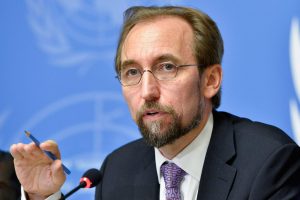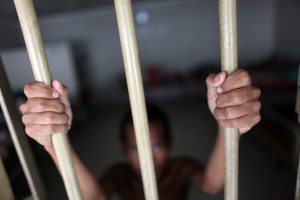By guest contributors Harsh Mahaseth* and Ishita Goel*
Although homosexuality is legal in most parts of Indonesia, it is widely believed that the unitary state of the Republic of Indonesia is anti-lesbian, gay, bisexual, and transgender (LGBT), with government officials making the four-letter acronym a toxic symbol.

In November, Indonesian police arrested Millen Cyrus, a trans-woman Instagram influencer, for alleged drug possession. Police placed her in a male detention cell at the Tanjung Priok Port Police Station, a move that received criticism from Indonesians and the international community. Millen Cyrus was arrested on November 22, 2020, after police raided her hotel room and discovered 0.36 grams of crystal methamphetamine in her possession. Police revealed later that Cyrus had been placed in a male detention cell because her I.D card identified her as a male. She was moved to a special cell following public outrage, not because police realised their mistake. They removed her from the male detention cell in order to “stifle anger,” police spokesman Yusri Yunus told Indonesian newspaper, Kompas.
Institute of Criminal Justice Reform’s (ICJR) researcher Maidina Rahmawati, claims that holding Millen Cyrus in a male detention cell had violated her human rights: “Holding a trans woman in a male detention cell clearly poses a security risk, stigma, harassment and violence, the inevitable potential for human rights violations,” she said in a statement.
Regrettably, this is not an isolated incident. The rights of Indonesian sexual and gender minorities have been under attack since 2016. Two years ago, the Indonesian police in the Muslim district of Aceh made headlines when they humiliated a dozen transgender women, forcing them to speak in a masculine voice, to cut their hair and wear male clothing. In another incident, the police in Indonesia’s capital city of Jakarta raided the Atlantis gym and sauna arresting about 140 mostly gay or bisexual members. Ten of the 140 were arraigned under Indonesia’s pornography law. The legislation bars pornographic acts and pictures, and broadly outlines pornography as “man-made sexual materials in the form of drawings, sketches, illustrations, photographs, text, voice, sound, moving pictures, animation, cartoons, poetry, conversations and gestures.” Public performances which could “incite sexual desire” are also prohibited under the law.
The legislation incriminates the violations with harsh penalties. Any person spotted “exhibiting nudity” in public could be imprisoned for up to 10 years and be fined up to $500,000. The ambiguous and broad provisions of the law are specifically used to target the LGBT community.
But the Atlantis was more than a “gay club,” it was also a public health outreach centre—a well-known hub for HIV education, testing, and counselling for males who have sex with males.
Since early 2016, senior government officials have created a moral panic by means of unprecedented attacks on LGBT people. Indonesia’s Minister of Defence, Ryamizard Ryacudu, labelled LGBT rights activism a proxy war on the nation led by outsiders, saying
“It’s dangerous as we can’t see who our foes are, but out of the blue everyone is brainwashed—now the LGBT community is demanding more freedom, it really is a threat…. In a nuclear war, if a bomb is dropped over Jakarta, Semarang will not be affected—but in a proxy war, everything we know could disappear in an instant—it’s dangerous.”
In 2016, the Vice President of Indonesia, Jusuf Kalla took it a notch further by asking the U.N. Development Program to stop $8 million funding for LGBT-related programs in Indonesia. Although advocates of human rights have protected their citizens, the Indonesian government has failed to uphold its international human rights obligations. In its place, the government has incited hatred, abhorrence and fanaticism, and institutionalized anti-LGBT bigotry by means of decrees and statutory propositions.
In Cyrus’s case, although the police decided to move her from the male detention cell, human rights activists believe that authorities should re-consider their narrow definition of gender to prevent similar cases in the future.
“Our country justifies a man as somebody with a penis, and a woman as somebody with a vagina, even though in many cases those with a penis identify as a woman and vice versa,” said Jakarta-based trans rights activist, Anggun Pradesha. “The State should accommodate those gender non-conformers,” she said.
It is time that Indonesia officially recognizes the existence of the LGBT community as a vital part of its society and safeguard their human rights through the prevailing human rights mechanisms existing at the global level.
Indonesia’s President, Joko Widodo, said in a speech to the U.K. Parliament in April 2016 that Indonesia is a country where Islam and democracy go hand in hand, and at the White House in October 2015 the President stated that “Islam in Indonesia is moderate, modern and tolerant.” But again the statement was contradicted when his spokesman, Johan Budi, said in response to a Human Rights Watch (HRW) report that “although rights of LGBT citizens are protected, there is no room in Indonesia for the proliferation of the LGBT movement.”
Recently, lawmakers in Indonesia’s House of Representatives (DPR) introduced a draft of what is being called as the “Family Resilience Bill.” The legislation would compel gay, lesbian, bisexual and transgender people to put up with treatment at the religious-based treatment centres that would be opened across the State. The Indonesian Parliament is also working on updating its Criminal Code; and under the provisions of these draft laws, a person who has sex with someone who is not their spouse could be prosecuted and be imprisoned for up to one year. The draft laws impact the LGBT community specifically, as gay marriage is not legal in Indonesia. Also, individuals convicted of a public act of gay sex could be sentenced to up to 18 months in prison which could extend up to nine years if evidence of abuse or video of the act is produced. ASEAN lawmakers have criticized the new draft, stating that it clearly violates Indonesians’ right to privacy and non-discrimination.

United Nations High Commissioner for Human Rights Zeid Ra’ad Al Hussein urged Indonesia’s government to scrap clauses in the new draft criminal code that would discriminate against LGBT people. Zeid observed that the anti-LGBT moral panic was, “being cultivated seemingly for cynical political purposes.”
For a country that prides itself on its democracy, the hostility towards the LGBT community ignites a different debate altogether. When it comes to these rights the nation confronts two alternatives: either uphold its democratic testimonials or hold fast to bigoted opinions. Indonesia, the largest Southeast Asian country — with its national motto of Unity in Diversity— can be a veritable revolutionary paradigm of democracy, if it supports its minority groups, including sexual minorities, otherwise Indonesia’s and Jokowi’s stirring declarations simply ring hollow.
All forms of intolerance and hostility based on sexual orientation and gender identity whether committed by State officials (including police and municipal police) or the general public (including faith-based organizations) should be penalised by anti-discrimination laws or policies.
The advocates of LGBT rights in Indonesia have come a long way. Several organizations have been set up to promote human rights and to pressure the government to protect the community. In 2013, the National Human Rights Commission of Indonesia set LGBT rights as a topic for plenary discussion after ten years. The Commission has been at the forefront in condemning anti-LGBT acts by the government. Furthermore, a commission should be set up for a full investigation of human rights violations faced by LGBT people.
Disappointingly, most of the political parties support the proposed legislation prohibiting homosexuality and recent years have seen a rise of hard-line, politicized Islam which has moved from the edge to the centre of politics.
*Harsh Mahaseth is an Assistant Lecturer and Faculty Board, JGLS Pro Bono Publicus, at Jindal Global Law School, and a Research Analyst at Center for Southeast Asian Studies, Jindal School of International Affairs, O.P. Jindal Global University.
*Ishita Goel is a 2nd-year student of the B.A.LLB (Hons.) course at Vivekananda Institute of Professional Studies, India.
Photos:
“HIV in Indonesia” by DFAT photo library is licensed under CC BY 2.0
“Zeid Ra’ad Al Hussein” by Prachatai is licensed under CC BY-NC-ND 2.0

